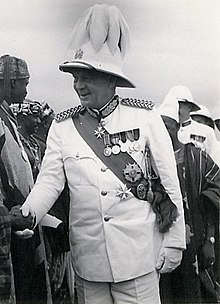Charles Arden-Clarke
Sir Charles Noble Arden-Clarke | |
|---|---|
 | |
| Governor-General of Ghana | |
| In office 6 March 1957 – 24 June 1957 | |
| Monarch | Elizabeth II |
| Prime Minister | Kwame Nkrumah (6 March 1957 – 1 July 1960) |
| Preceded by | Newly created position |
| Succeeded by | Lord Listowel |
| Governor of the Gold Coast | |
| In office 11 August 1949 – 6 March 1957 | |
| Monarchs | George VI Elizabeth II |
| Prime Minister | Kwame Nkrumah (21 March 1952 – 6 March 1957) |
| Preceded by | Sir Robert Scott |
| Succeeded by | Position abolished |
| Resident Commissioner of Bechuanaland | |
| In office 1937–1942 | |
| Preceded by | Charles Fernand Rey |
| Succeeded by | Aubrey Denzil Forsyth-Thompson |
| 1st Governor of Sarawak | |
| In office 1 July 1946 – 26 July 1949 | |
| Monarch | George VI |
| Preceded by | Newly created position |
| Succeeded by | Duncan George Stewart |
| Personal details | |
| Born | 25 July 1898[1] Bournemouth, England |
| Died | 16 December 1962 (aged 64)[2] Syleham, England |
Sir Charles Noble Arden-Clarke GCMG[3] (25 July 1898 – 16 December 1962) was a British colonial administrator.
Arden-Clarke was educated at Rossall School.[4] He was the Resident Commissioner of the Bechuanaland Protectorate (later Botswana) between 1937 and 1942, a time at which the ruling regent Tshekedi Khama was in violent conflict with the British authorities.[5] He was the Resident Commissioner of Basutoland from August 1942 to November 1946, and in 1946 was appointed as the first Governor of the newly created British Crown Colony of Sarawak, which was ceded in 1946 by the Kingdom of Sarawak. During his governorship in Sarawak he was despised by locals as, upon his appointment, Sarawak was engulfed with the Anti-cession Movement, which led to the assassination of his successor, Duncan Stewart in 1949 by the radical members of the Anti-cession movement.
After Sarawak, he was the last governor of the Gold Coast from August 1949[5] until 1957 (later Ghana). On 12 February 1951, he authorised Kwame Nkrumah's release from imprisonment in James Fort. After independence, he was named the first Governor-General of Ghana in 1957. Arden-Clarke's acceptance of the Africans and his attitude towards Kwame Nkrumah likely contributed to Ghana's relatively smooth transition to independence.
References
- ^ Who's who of Southern Africa. Ken Donaldson (Pty.) Limited. 1959.
- ^ African Affairs. Royal African Society. 1968.
- ^ 1952_New_Year_Honours
- ^ Arden-Clarke. "Arden-Clarke, Sir Charles Noble". Who's Who. A & C Black.
{{cite encyclopedia}}: Unknown parameter|othernames=ignored (help) (Subscription or UK public library membership required.) - ^ a b David Birmingham (1998). Kwame Nkrumah: The Father of African Nationalism (Rev. ed.). Ohio University Press. pp. 38–39. ISBN 978-0-8214-1242-8.
Archives
Papers of Charles Arden-Clarke giving an insight into events during the transition of the Gold Coast to independent Ghana (1949-1957) are held by SOAS Special Collections
- Colonial Administrative Service officers
- Governors of Bechuanaland Protectorate
- Governors of the Gold Coast (British colony)
- Governors of Sarawak
- Governors-General of Ghana
- 1898 births
- 1962 deaths
- Knights Grand Cross of the Order of St Michael and St George
- People educated at Rossall School
- Basutoland in World War II
- Bechuanaland in World War II
- 1930s in Bechuanaland Protectorate
- 1940s in Bechuanaland Protectorate
